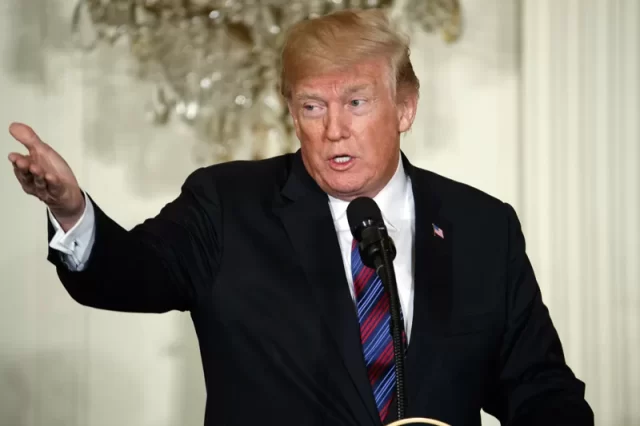Former President Donald Trump pleaded not guilty to 34 felony criminal charges of falsifying business records in Manhattan criminal court Tuesday afternoon.
Trump surrendered and was placed under arrest Tuesday before he was arraigned in a historic and unprecedented court appearance, in which the former president heard the charges against him for the first time. While the arraignment was routine, the case is now poised to linger over Trump’s 2024 candidacy as he fights the charges both in court and in public.
Prosecutors alleged that Trump sought to undermine the integrity of the 2016 election through a hush money scheme with payments made to women who claimed they had extramarital affairs with Trump. He has denied the affairs.
Trump was part of an unlawful plan to suppress negative information, including an illegal payment of $130,000 that was ordered by the defendant to suppress the negative information that would hurt his campaign, prosecutors alleged.
Trump “repeatedly and fraudulently falsified New York business records to conceal criminal conduct that hid damaging information from the voting public during the 2016 presidential election,” according to the charging documents.
After the arraignment, Trump immediately flew back to Florida. He held an event with his supporters Tuesday evening at his Mar-a-Lago resort, where Trump made his public case against the indictment and previewed how he intends to fight against the charges politically as he runs again for the White House in 2024.
While he was warned by Judge Juan Merchan during Tuesday’s arraignment not to make comments that could “jeopardize the rule of law” or create civil unrest, Trump railed later that evening against Manhattan District Attorney Alvin Bragg and the judge himself.
“I never thought anything like this could happen in America, never thought it could happen. The only crime that I have committed is to fearlessly defend our nation from those who seek to destroy it,” Trump said.
“It’s an insult to our country,” he added.
The indictment returned last week by a grand jury against Trump was unsealed Tuesday and provided the public – and Trump’s legal team – with the first details about the specific charges he will face.
The indictment was quickly criticized by Trump’s Republican allies, and even some legal experts raised questions about the case. CNN Senior Legal Analyst Elie Honig said that prosecutors will have to make their case that Trump committed felonies and not misdemeanors by showing that the falsified records were used to conceal another crime, which was not identified in the indictment.
“One of the complicated legal questions here is in order to bump that up from a misdemeanor to a felony you have to show that those records were falsified to commit some other crime, some second crime,” Honig said. “You heard the defense lawyers, I think, rightly, complaining about that.”
Bragg said at a news conference after the arraignment that the indictment did not specify what laws Trump broke because “the law does not so require.”
Bragg highlighted one law that Trump allegedly broke during the conference: “New York state election law – what makes it a crime to conspire to promote a candidacy by unlawful means.” He also mentioned violations of a federal election law capping contribution limits.
The evidence, Bragg said, will be “borne out in a public courtroom in downtown Manhattan,” he said.















